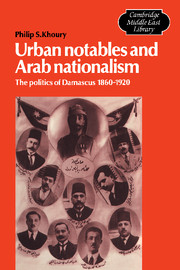Book contents
- Frontmatter
- Contents
- List of maps
- Note on transcription
- Preface
- Introduction
- 1 The political configuration of Damascus in 1860
- 2 The consolidation of leadership in Damascus after 1860
- 3 Damascus notables and the rise of Arab nationalism before World War I
- 4 Notables, nationalists and Faysal's Arab government in Damascus, 1918–20
- Conclusion
- Notes
- Bibliography
- Glossary of Arabic, Persian and Turkish terms
- Index
- Frontmatter
- Contents
- List of maps
- Note on transcription
- Preface
- Introduction
- 1 The political configuration of Damascus in 1860
- 2 The consolidation of leadership in Damascus after 1860
- 3 Damascus notables and the rise of Arab nationalism before World War I
- 4 Notables, nationalists and Faysal's Arab government in Damascus, 1918–20
- Conclusion
- Notes
- Bibliography
- Glossary of Arabic, Persian and Turkish terms
- Index
Summary
Intellectual histories of the origins and content of Arab nationalism abound and insofar as these histories deal with the birthplace of Arab nationalism they must discuss political life in Syria just before World War I. Few histories, however, investigate the social conditions which gave birth to this ideology and which rendered it uniquely useful to Syrians, enabling Arab nationalism to become the reigning political idea in the Arab East after the War.
This study will attempt to situate Arab nationalism in the social and political environment in which it evolved in its infancy. It is a study of one social class in one town, Damascus. It is my argument that Damascus supplied a disproportionate share of the leading lights guiding the growth of the Arab nationalist movement in the early years of the twentieth century and that most important nationalist politicians in Damascus emerged from a single class in that city. This class, which I shall call the ‘landowning-bureaucratic class’, began to assume its shape in the last half of the nineteenth century–that of a fairly well-integrated network of propertied and office-holding urban families which was to produce the political leadership in Damascus and other Syrian towns for several generations. And it was out of a struggle for power and position between two factions of this leadership that the idea of Arabism emerged as a political movement, one ultimately with widespread appeal in the Arab countries.
The city as the locus of political power and influence in Syria dates from antiquity.
- Type
- Chapter
- Information
- Urban Notables and Arab NationalismThe Politics of Damascus 1860–1920, pp. 1 - 7Publisher: Cambridge University PressPrint publication year: 1983

